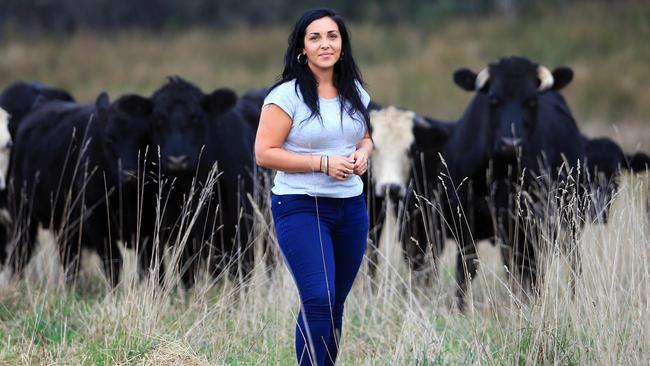Billions at stake: How our ag industry has been hit by Omicron
Supermarkets shelves are empty and Victorian farmers remain on tenterhooks as the food-supply worker crisis threatens to worsen.
Australia’s billion-dollar agriculture industry remains on tenterhooks as a pandemic-triggered food-supply worker crisis threatens to worsen.
In the past week:
MAJOR abattoirs have been forced to close or reduce multiple shifts as the availability of workers plummets.
OFFERINGS of sheep and cattle at major selling centres have fallen to their lowest levels in years due to reduced processing capacity.
HORTICULTURE growers are weighing up mulching fruit due a lack of farm labour and reduced supermarket orders.
The rapid spread of the Omicron Covid variant is behind the crisis with state and federal governments last week forced to act by allowing exemptions to Covid isolation rules for workers in the food processing and distribution industries.
The beef sector in particular has been among the hardest hit by the crisis.

The Weekly Times understands Warrnambool meat processor Midfield Meat was forced to close three days last week and one day this week due to extreme staff shortages while HW Greenham and Sons’ processing facility at Tongala has closed this week after 30 per cent of staff tested positive for Covid.
A Midfield spokesman said the business ran at just 25 per cent capacity on Friday, and 15 per cent on Monday, due to an inadequate workforce.
Greenham general manager Tom Maguire said it had closed Tongala after 24 staff tested positive for Covid on Monday which was “an absolute shock to a lot of people — there were plenty of asymptomatic infections”.
Mr Maguire said the company’s processing facility at Moe was closed last week due to positive cases, but had reopened this week at about 75 per cent capacity.
He said the company would be managing through “constant disruptions” over the coming weeks as coronavirus continued to spread in the community.
Greenham said it had opted to close the facilities rather than ask asymptomatic staff to keep working with precautions. “We don’t want sick people working,” Mr Maguire said.
The closure of two of Victoria’s biggest abattoirs comes as cattle slaughter rates continue to soften nationally. Slaughter rates for last week totalled 41,687 head — down from 70,795 during the corresponding week last year.
Saleyard numbers too have dipped significantly. Meat and Livestock Australia market information manager Stephen Bignell said the Wagga Wagga prime cattle market on Monday totalled just 830 head. “That’s the third-lowest level seen in about three years,” Mr Bignell said.
On the horticulture front, producers are being forced into making tough decisions between picking produce and risk not having labour to pack and export, or mulching fruit and vegetables back into the ground.

Victorian Farmers Federation president Emma Germano said the supply chain situation was a “complex issue that isn’t going to be fixed overnight”.
“We absolutely need access to RATs to ensure those who are sick don’t go to work and others get back to re-establishing our essential supply chains,” Ms Germano said.
Last week, state and federal government announced exemptions to Covid isolation rules for workers in the food processing and distribution industries.
But Victorian Farmers Federation horticulture president Nathan Free said producers continued to be affected by worker shortages that started well before the Omicron outbreak.
“Horticulture has a time sensitive aspect to it, and some manual tasks when compared to other commodities. This is taking a big toll,” Mr Free said.
United Dairyfarmers of Victoria president Paul Mumford said much like every other agricultural commodity, dairy was “under extreme duress”.
“It’s extremely stressful, and dare I say, the industry including dairy highlighted these issues about 18 months ago, and it’s disappointing to get to this point where we’re now restricted by waiting for RAT tests,” Mr Mumford said.
Meanwhile, a spokeswoman for Woolworths said the supermarket giant had increased some of its fruit and vegetable orders, after last week cutting purchase orders because distribution centres were too short staffed to deal with normal delivery volumes.
“Suppliers have also been instrumental in assisting us to deliver almost 180,000 cartons direct to stores outside of our normal distribution network, helping alleviate pressure on our store teams and the suppliers themselves,” the spokeswoman said.
Woolworths has been conducting daily rapid antigen tests for its distribution centre staff to “identify positive cases early and prevent transmission on site”. The supermarket said it had adequate supply of RATs.
A Coles spokesman said the majority of shortages at its stores were due to suppliers unable to fulfil normal order volumes.



